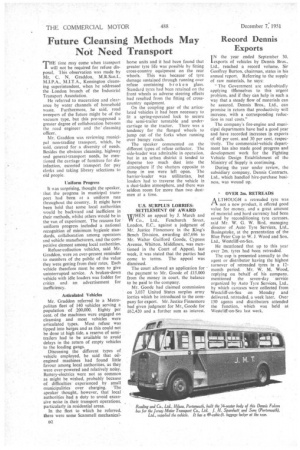Future Cleansing Methods May Not Need Transport
Page 42

If you've noticed an error in this article please click here to report it so we can fix it.
THE time may come when transport will not be required for refuse disposal. ibis observation was made by Mr. C. N. Graddon, M.R.San.l., M.I.P.A., M.1.T.A., Kensington cleansing superintendent, when he addressed the London branch of the Industrial Transport Association.
He referred to maceration and clearance by water channels of household waste. Furthermore, he said, road sweepers of the future might be of the vacuum type, but this pre-supposed a greater degree of collaboration between the road engineer and the' cleansing officer.
Mr. Graddon was reviewing municipal non-trading transport, which, he said, catered for a diversity of needs. Besides the obvious cleansing, highway and general-transport needs, he mentioned the carriage of furniture for disinfection, escorted transport for pay clerks and taking library selections to old people.
Uniform Progress It as surprising, thought the speaker, that the progress in municipal transport had been at a uniform rate throughout the country. It might have been held that some local authorities would be backward and inefficient in their methods, whilst others would be in the van of experiment. The reasons for uniform progress included a national recognition of minimum hygienic standards. collaboration among operators and vehicle manufacturers, and the competitive element among local authorities. Refuse-collection vehicles, said Mr. Graddon, were an ever-present reminder to members of the public of the value they were getting from their rates. Each vehicle therefore must be seen to give uninterrupted service. A broken-down vehicle with idle loaders was fodder for critics and an advertisement for inefficiency.
Articulated Vehicles
Mr. Graddon referred to a Metropolitan fleet of 140 vehicles serving a population of 200,060. Eighty per cent. of the machines were engaged on cleansing and most vehicles were articulated types. Most refuse was tipped into barges and as this could not be done at high tide, a reserve of semitrailers had to be available to avoid delays in the return of empty vehicles to the loading gangs. Discussing the different types of vehicle employed, he said that oilengined machines had found little favour among local authorities, as they were over-powered and relatively noisy. Battery-electrics were not as common as might be wished, probably because of difficulties experienced by small municipalities over charging. The speaker thought, however, that local authorities had a duty to .avoid excessive noise in their transport operations, particularly in residential areas.
In the fleet to which he referred, there were some Scammell mechanical
horse units and it had been found that greater tyre life was possible by fitting cross-country equipment on the rear wheels. This was because of tyre damage sustained through running over refuse containing brok en glass. Standard tyres had been retained on the front wheels as adverse steering effects had resulted from the fitting of crosscountry equipment.
On the coupling gear of the articulated vehicles it had been necessary to fit a spring-operated lock to secure the semi-trailer turntable and undercarriage to the tractor. There was a tendency for the flanged wheels to jump out ,of the forks when running over bumpy roads.
The speaker commented on the different types of refuse collector. The side-loader was admirable in operation, but in an urban district it tended to disperse too much dust into the atmosphere if the shutters opposite to those in use were left open. The harrier-loader was utilitarian, but loaders had to traverse the vehicle in a dust-laden atmosphere, and there was seldom room for more than two dustmen at a time.
US. SURPLUS LORRIES: SETTLEMENT OF AWARD
WHEN an appeal by J. March and W Co., Ltd., Fenchurch Street, London, E.C., against a judgment of Mr. Justice Finnemore in the King's Bench Division, awarding £67,696 to Mr. Walter Guilford Goode, Cypress Avenue, Whitton, Middlesex, was mentioned in the Court of Appeal, last week, it was stated that the parties had come to terms. The appeal was dismissed.
The court allowed an application for ' the payment to Mr. Goode of £15.000 from the money in court, the balance to be paid to the company.
Mr. Goode had claimed commission on 3,037 United States surplus army lorries which he introduced to the company for export. Mr. Justice Finnemorc had given judgment for Mr., Goode for £62,420 and a further sum as interest.
































































































